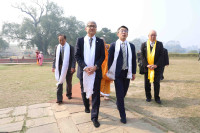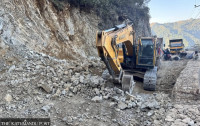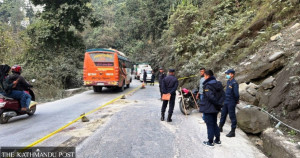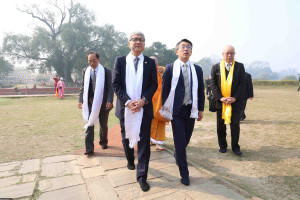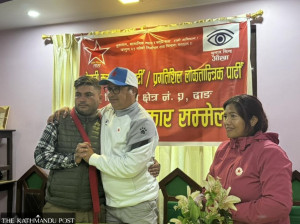Lumbini Province
Human traffickers, in a change of tricks, are now waiting across the border
Despite decades of surveillance and awareness programmes, hundreds of women continue to be trafficked across the open Nepal-India border every year.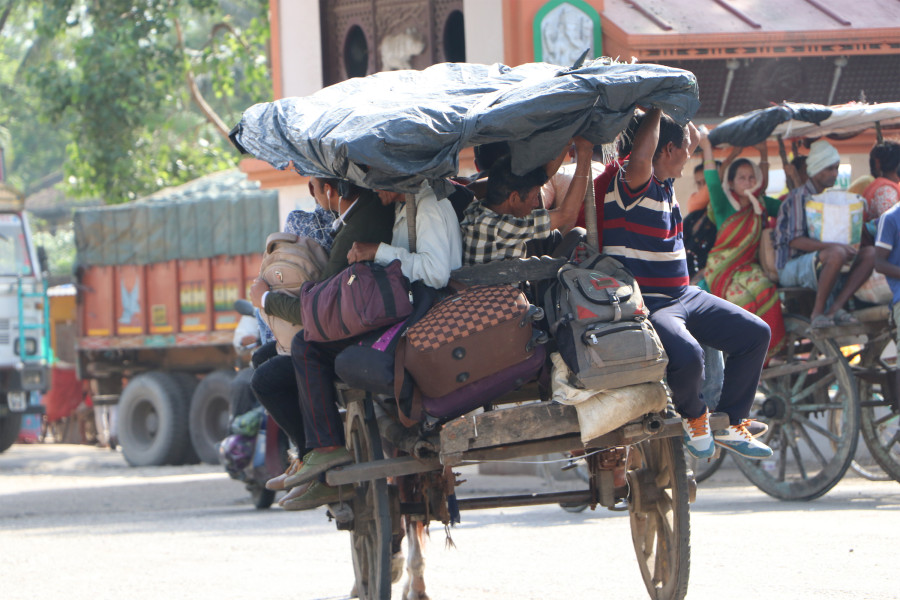
Madhu Shahi
On Saturday, two Nepali girls, both 17, were on their way to Bahraich in India’s Uttar Pradesh, when they were stopped at the border town of Jamunaha for a routine police check. The girls said they were going to observe the annual Bahraich Mela, but upon further questioning, they said that they were going to meet some men across the border. These men, the police discovered, were human traffickers, who had lured these girls with promises of a job.
Thousands of Nepalis cross the open border into India every day. Many work across the border while others go to shop for daily necessities and higher-end products that might not be available on the Nepal side. But the Nepal-India border is also notorious for the trafficking of young women.
“All too frequently, these innocent Nepali girls fall into traps of human traffickers,” said Keshav Koirala, Nepalgunj coordinator of Maiti Nepal, the anti-trafficking organisation. “Many say they are going for shopping but the truth turns out to be otherwise.”
Maiti Nepal, along with a number of other anti-trafficking organisations, routinely stops and questions young women crossing the border with the help of police. But these organisations face a dilemma.
“If we prevent them from crossing the border, it would be a violation of their human rights,” said Koirala. “But if we let them go, there is the risk of them being trafficked.”
Ever since the Nepal Police stepped up anti-trafficking efforts on this side of the border, human traffickers have adopted a different tactic. Now, they lure women into India with promises of lucrative jobs and higher education, said Koirala. The traffickers meet the women across the border and then spirit them away to the cities, where they are sold into sexual slavery. Many women cross the border and never return, say police.
Koirala told the Post of one such teenager who attempted to cross the border recently by herself.
“At first, she said she was going to shop for vegetables but after extended interrogation, she revealed that she was running away from her family to meet some men across the border,” said Koirala. “We made her return home.”
Traffickers take advantage of the fact that most Nepalis depend on Indian border towns for many of their daily essentials, everything from sundries to groceries.
According to data from Maiti Nepal, a total of 920 women were found to have travelled “suspiciously” to India in 2018. Of them, 27 were from the Nepalgunj Sub-metropolitan City and over a hundred from the neighbouring municipalities of Baijanath, Khajura, Kohalpur and Duduwa.
A lucrative market for seasonal labour migration has now opened in Shimla, picking apples, said Maiti Nepal’s Koirala, but on their way there, many Nepali women fall victim to traffickers.
“Maiti Nepal, in coordination with the police, has been trying really hard to prevent such incidents by making the enquiry processes more rigorous,” Koirala said. “But despite our measures, it’s hard to prevent the girls in the bordering areas from being trafficked.”
In tested fashion, traffickers exploit the ambition of young girls, promising them money and a better education, according to Nirmala Thapa, an officer with Shakti Nepal, another anti-trafficking organisation. Because they are young and naive, most are easily sold on these promises. In many cases, the traffickers are the victim’s relatives and their lovers.
“The traffickers weave stories targeting the young girls’ fragile minds. This week, we found out that a 20-year-old was promised a marketing job in Dang but was taken to Nepalgunj,” said Thapa. The implication here is that she was going to be trafficked across the border.
Just last week, Shakti Nepal rescued five Nepali teenage girls from a brothel in India. Two were from families affected by the 2015 earthquake in Nuwakot and Sindhupalchok, said Thapa.
Despite decades of working along the border region and conducting countless awareness campaigns, results have not been all that positive, said Thapa.
“It’s very hard to detain traffickers,” she said. “Even if we locate the perpetrators, it’s hard to bring them to book because of their political clout. Often, the police do not want to register such cases.”
The city of Nepalgunj, in coordination with Sathi, will soon be putting up information centres at the border crossing where women will need to provide detailed answers to where they are coming from, where they are travelling to, and for what purpose, according to Uma Thapa, Nepalgunj deputy mayor.
“The only option seems to be to regulate the border,” Thapa said. “Along with more rigorous awareness programmes, we need to make crossing the open border stricter.”
***
What do you think?
Dear reader, we’d like to hear from you. We regularly publish letters to the editor on contemporary issues or direct responses to something the Post has recently published. Please send your letters to [email protected] with "Letter to the Editor" in the subject line. Please include your name, location, and a contact address so one of our editors can reach out to you.




 13.12°C Kathmandu
13.12°C Kathmandu


